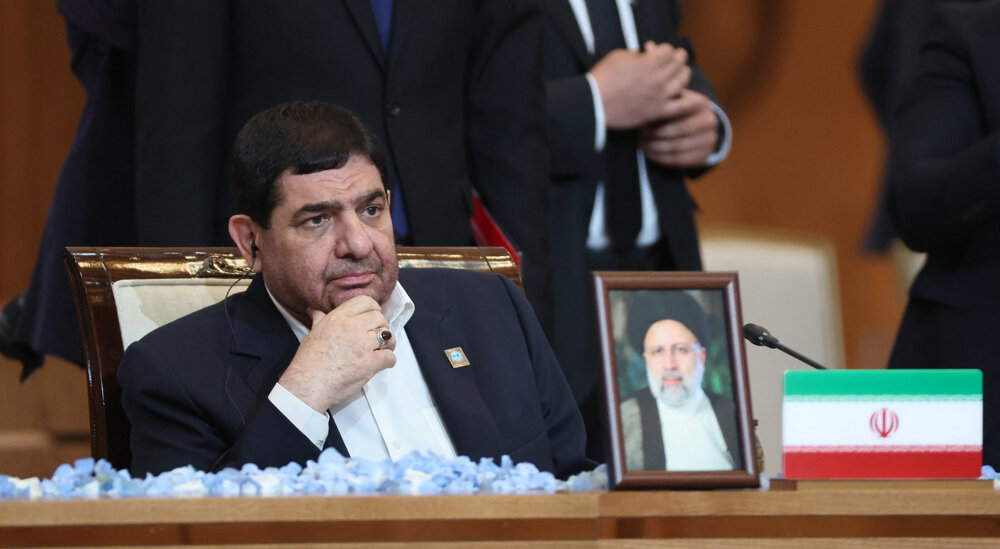SCO can foster regional, international peace: Iran acting president

TEHRAN – Iran's acting president, Mohammad Mokhber, has highlighted the potential of the Shanghai Cooperation Organization (SCO) to foster sustainable peace both regionally and globally.
Speaking at the 24th Meeting of the Council of Heads of State of the SCO in Astana, Kazakhstan, Mokhber urged SCO members to strengthen their transit, commercial, and banking ties, advocating for a move away from the U.S. dollar in economic transactions.
“There are many opportunities and capacities in the territory of the member countries of the Shanghai Cooperation Organization in the field of trade, production, energy, transportation, agriculture, customs, telecommunications, as well as the development of technology in the field of artificial intelligence, for interaction, which should be used for the benefit of the welfare of nations and consolidation of sustainable peace and inclusive development in the Shanghai region and around the world,” Mokhber stated on Thursday.
He emphasized the importance of activating transit corridors to facilitate trade and economic growth, pointing to the International North–South Transport Corridor (INSTC) and southern Iranian ports as key components. “We believe that the members of the Shanghai Cooperation Organization can trade with the countries of the world through the North-South Corridor and through the southern ports of Iran at a lower cost and faster pace,” he said.
Mokhber proposed creating a network of free zones and preferential trade agreements within the SCO, and advocated for the use of national currencies in multilateral transactions to reduce reliance on the U.S. dollar. Additionally, he suggested the establishment of an SCO joint bank to boost financial and economic cooperation among member states. “Establishment of the Shanghai Joint Bank can improve the level of cooperation of the member countries in the financial and economic fields,” Mokhber noted.
Condemning the use of unilateral sanctions, particularly in the energy sector, Mokhber mentioned Iran’s active role in drafting the SCO’s energy cooperation strategy. “The Islamic Republic of Iran is strongly opposed to the use of political tools, especially unilateral sanctions in the field of energy,” he stated, emphasizing multilateralism in energy cooperation.
Addressing the ongoing conflict in Gaza, Mokhber called for urgent action by the SCO and the international community to stop Israel’s war crimes and provide humanitarian aid to Palestinians. “Unfortunately, during the past 9 months and contrary to all international standards and human ethics, we are witnessing a widespread wave of genocide, war crimes, mass killing of innocent women and children of Gaza by the Zionist regime,” he said. He condemned the Israeli military actions, accusing the regime of committing genocide in Gaza with U.S. support, and urged for immediate intervention to end the atrocities.
Since the conflict escalated on October 7, Israeli forces have reportedly killed over 37,953 Palestinians, mainly women and children, and injured more than 87,266. Mokhber emphasized, “We strongly condemn the continuation of brutal, organized crimes by the Zionist regime with the support of the United States against the resistant and oppressed people of Gaza, which has stunned the human society and left international organizations in inaction.”
Mokhber concluded by expressing confidence in the SCO's decisions and agreements, believing they will significantly enhance cooperation among member countries in various fields. He extended his gratitude to Kazakhstan for hosting the summit and congratulated China on assuming the next SCO presidency.
The Shanghai Cooperation Organization, an intergovernmental entity formed in 1996 by the leaders of China, Russia, Kazakhstan, Kyrgyzstan, and Tajikistan, aims to foster multilateral security, economic, and political cooperation. Established to counterbalance U.S. and NATO influence in the region, the SCO expanded with Uzbekistan's inclusion shortly after its founding, adopting its current name.
Iran's membership was initially agreed upon during the late President Raisi's visit to Dushanbe, Tajikistan, on September 17, 2021, and later ratified by the Iranian parliament on November 27, 2022. The formal announcement of Iran's membership occurred during a virtual summit of SCO heads of state on July 4, 2023.
In a message on his X account on Thursday, Ali Baqeri Kani, Iran’s acting Foreign Minister, stated that Iran has now turned into a partner in the process of decision-making in the Shanghai Cooperation Organization.
“If until yesterday we were only ‘collaborators’ with the Shanghai Cooperation Organization Member States, thanks to the initiative of the martyr Raisi's administration, today we are ‘partners in decision-making’ within this international political-security mechanism,” Baqeri noted.
‘Relations between Iran, China are based on mutual interests’
Iran's acting president also met with Chinese President Xi Jinping on the sidelines of the 24th summit of the Council of Heads of State of the SCO in Astana, Kazakhstan.
During this meeting, Mokhber stated that the relationship between Iran and China is founded on shared interests and mutual respect.
Mokhber expressed gratitude to the Chinese government and people for their sympathy and solidarity following the death of President Ebrahim Raisi in a helicopter crash on May 19 in Iran’s northwestern province of East Azarbaijan.
“The relations between Iran and China are strategic and based on mutual interests and respect. They are deepening and developing,” Mokhber said.
He highlighted the commitment of Iranian and Chinese officials to further expand cooperation in economic, commercial, and energy sectors.
Xi, in turn, offered his condolences over President Raisi’s death and asked Mokhber to convey his sympathies to the Leader of the Islamic Revolution, Ayatollah Seyyed Ali Khamenei.
Xi reiterated that the relations between Beijing and Tehran are strategic and emphasized that China's policy to strengthen ties with Iran is not swayed by external influences.
The Chinese president also stressed his country’s desire for the development, progress, and welfare of the Iranian people.
Leave a Comment